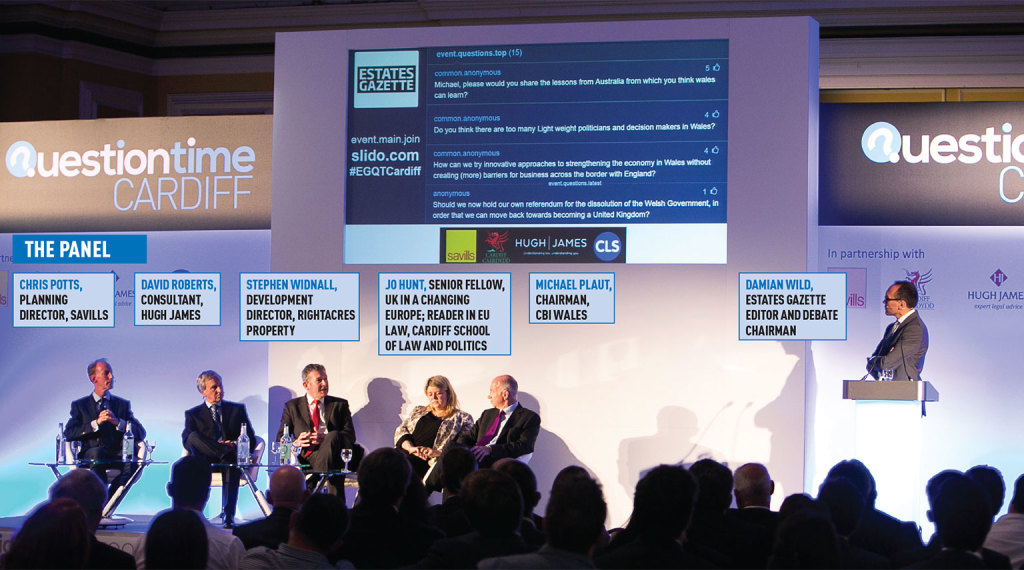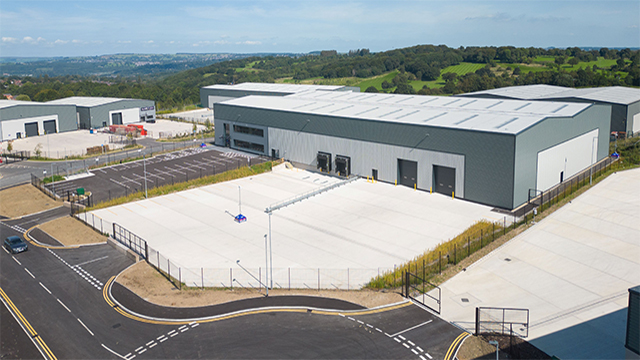Wales voted to leave the EU by 52.5% to 47.5% on 23 June. Just a week later, you might have expected the Cardiff business community to be reeling from the result, but the pervading sense at Cardiff Question Time was that Wales must “keep calm and carry on”.
Unexpected though the outcome of the referendum was, the crowd that gathered at Cardiff City Hall on 30 June was urged to be buoyed by the opportunities that Brexit could create, and to focus on inward investment as key to keeping Wales competitive in the global market.
Speaking with a panel of industry leaders, the chairman of CBI Wales, Michael Plaut, said the country should seek the silver lining in the current political situation.
“We should be able to respond very quickly to change, because there are only 3m of us. We were the first industrialised nation in the world. Out of the rejection of the EU will have to come a new approach,” he said.
“We need to focus on a future of hope, rather than one of decline, and we can see the rebirth of Wales if we do things differently. We have to stop focusing on funding and get on with wealth creation.”
The “can do” attitude and global competitiveness of countries like Australia should be an example, said Plaut. He praised Australia for having “courage” that Wales lacked.
Plaut’s sentiment was echoed across the panel.

Jo Hunt, senior fellow at UK in a Changing Europe and reader in EU law at Cardiff University School of Law and Politics, said: “With the process of devolution, we are creating those structures to give Wales more responsibilities. It is about having the courage to work within those structures.
“I think there is amazing talent and ability within Wales and it is important to see the potential is there. It is about realising and harnessing that.”
Private investment into Wales goes “hand in hand” with this confident attitude, according to Stephen Widnall, development director at Rightacres Property.
He said producing schemes that further encouraged UK institutions to pump money into the country was a recipe for success.
In 2015, L&G and Rightacres entered into a joint partnership that will accelerate completion of the 1m sq ft Central Square scheme in the heart of Cardiff. Widnall cited L&G’s backing of the massive regeneration project as evidence of institutional support.
“It has been difficult in the past to get institutions to invest proper sums of money. Once they have their little retail park or industrial estate, the box is ticked. It is up to us to break that mindset.”
Delegates also focused on what was holding Wales back, blaming overregulation and an “unambitious” government.
Hunt suggested that no longer having the EU as a “backstop” might generate the opportunity for greater regulatory diversity in a devolved Wales.
David Roberts, a consultant at Hugh James, sounded a note of caution. He said that while devolution had helped Wales with its identity, more cohesion was needed between local authorities if the country were to achieve its goals.
“The Welsh government is overzealous in terms of regulation,” he added.
Streamlining the Welsh planning system and investing in infrastructure, not just in Cardiff but in the wider regions, was also needed to promote business in the country.
 Chris Potts, planning director at Savills, said leaders should focus on delivering infrastructure projects instead of simply paying lip service to them and warned there was more “regulation on the way”.
Chris Potts, planning director at Savills, said leaders should focus on delivering infrastructure projects instead of simply paying lip service to them and warned there was more “regulation on the way”.
“The question isn’t one of lightweight politicians, it is ‘have we got the best and brightest people working in government?’ ” he said. “We spend a long time debating on a political level about infrastructure when, actually, we are delaying the benefits.
“Another area that needs an urgent rethink is our national planning framework – we are going to have one under a new planning act, but not for three-and-a-half years. It is poor, especially if we might leave [the EU] in two years. It sends the wrong messages.”
Potts voiced a need for the departments responsible for delivering housing and the planning system to be aligned, saying it should not be a political decision to build housing.
Other infrastructure inhibitors included the lack of a metro and the Severn Bridge toll, which was slammed by Plaut. “If we got rid of it, Wales would be open for business. Why do we make people queue to see us? It is a joke – we are a serious country.”
Roberts described the corrections between Cardiff Bay and the city centre as “appalling” and said that it was frustrating to see politicians setting one project against another.
The debate, however, ended on a hopeful note.
Widnall agreed investment in infrastructure was what drove the economic success of an area, and without EU funding it would be the Welsh government’s responsibility to see money went to the regions that needed it most.
But he added that the Brexit vote had the potential to be a “game changer” for the UK.
“It might be negative for the short and even the medium term, but who is to say in the long term it is not the very thing that the country needed? Not because of issues that the referendum was fought around, but because it could lead to the collapse of a political elite in London.”
“Stop moaning”
Calling on the country to seize the initiative, Michael Plaut, chairman of CBI Wales, roused the audience with a positive and forward-thinking tone.
Plaut praised the property industry as being one of the last areas where individuals could make a difference. He also spoke of the importance of caution in the wake of political events, focusing on the result of the
EU referendum.
“We need to take stock. If we trigger Article 50, we are suddenly on a path we have no control over. While Westminster urges caution, Cardiff wants to get on with it, but there is a lot for us to gain by waiting, and as the political situation evolves, things will change,” he said.
Plaut also said there was room for criticism in Wales, pointing to its past industrial achievements to show how it could take back control of its future.
“We have the most amazing history in Wales, I think we forget it. Swansea was the tech hub of the world in the 18th century and, a century later, South Wales was energy capital of the world. How many countries can say they were leading the front in two different industries worldwide?
“If we in Wales can embrace where we are, stop moaning and actually start looking at how we can really develop our economy, I think we will be in a better position in 10 or 20 years than we could ever imagine we could be. It is important if we want to change Wales that we have a feeling of what is holding us back.”
• To send feedback, e-mail Shekha.Vyas@estatesgazette.com or tweet @shekhaV or @estatesgazette



































